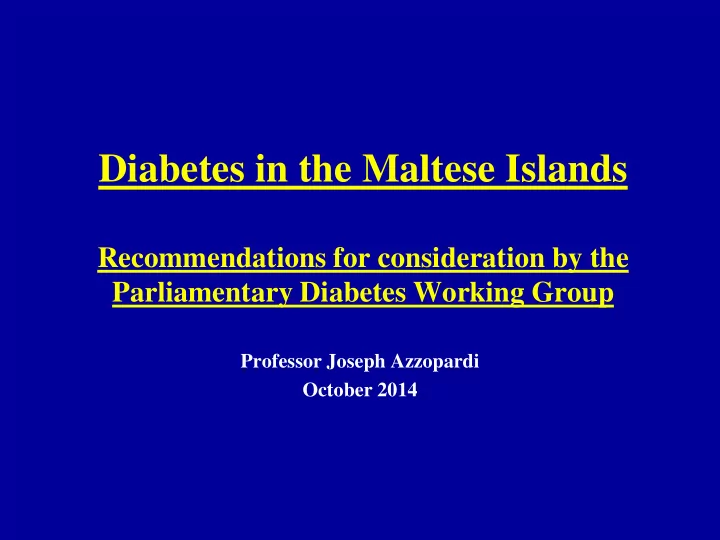

Diabetes in the Maltese Islands Recommendations for consideration by the Parliamentary Diabetes Working Group Professor Joseph Azzopardi October 2014
Diabetes Common, getting commoner • Raised blood glucose levels • Can cause serious problems, including early death • Serious financial burden on society
The Diabetes Services in Malta • People with diabetes are entitled to free treatment • Diabetes Clinics in Mater Dei &Peripheral Centres – Adult and Paediatric • Take care of 95% of all diabetic people in Malta
The Diabetes Services • Eyes: Screening, Laser and vitreous replacement • Cardiac and peripheral vascular unit • Podology, orthotics and prosthetics service • A joint Obstetrics – Diabetes clinic • Dialysis and Transplant Service
Other Services • Education – Type 1: individual education with relatives – Type 2 Diabetes: Group Education – Maltese Diabetes Association – Health Promotion Unit • Dietetics • Limited free blood glucose monitoring service
The Proposed National Diabetes Framework should help develop further and coordinate better these existent services
This Document and Presentation • Background Information on Diabetes • The Electronic Medical Record • Shared Care • Complications • Dietary, Podology, Education Services • Psychosocial Services
The main focus of this presentation is on the use of Information Technology in Diabetes in Malta
Digital Records • Are instantly available • Easily readable • Increase speed of information exchange • Easily available for research, audit and reports
Electronic Diabetes Data in the Health Department • 1980’s: WHO donated system • 1990’s: In house system developed that has been updated regularly. Last update: 2014 • As of June 2014 there were 23588 patients registered and 115161 patient visits on the database
This Presentation • How the System works • Pending issues
Functions of the Diabetes Computerised System Complete day to day Patient Management
Functions of the System • A source of data for Research and Reports • A Basis for a National Diabetes Registry • A source of data information exchange for the European Union EUBIROD – EUBIROD can create comparative reports on data aggregated from various centres
Patients seen by (JA) between January – June 2013 n(%) Patients Visits M F Smokers Ex Smokers BP Treat DR MI 770 880 404(53) 366(47) 27(4) 36(5) 114(15) 16(2) 15(2)
Invitation to see the system working
Pending Issues with the System • Use of System is on a voluntary basis • Manual data entry is still being used for a considerable proportion of patients • Data recording in our clinics is a mixture of manual and computer data entry • The System is not being used to its full potential
What is needed • An agreed upon departmental policy that all patient data is computerized • It is only then that – Each patient will have an electronic record – The system will be able to generate statistically meaningfully national data
May I respectfully ask that the parliamentary group include this policy in its report and recommendations
Recommend
More recommend